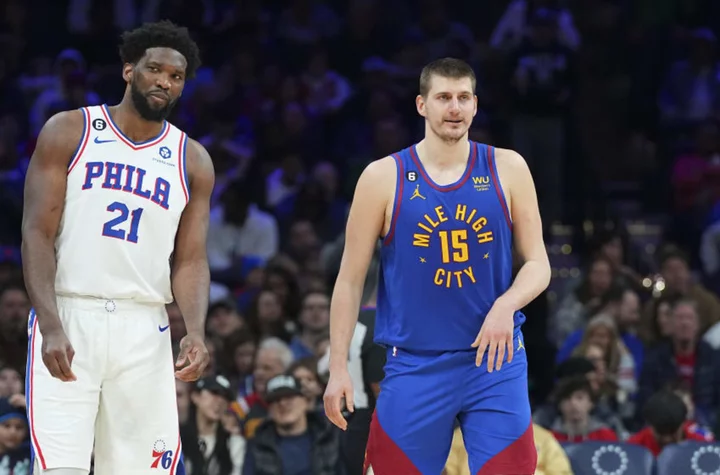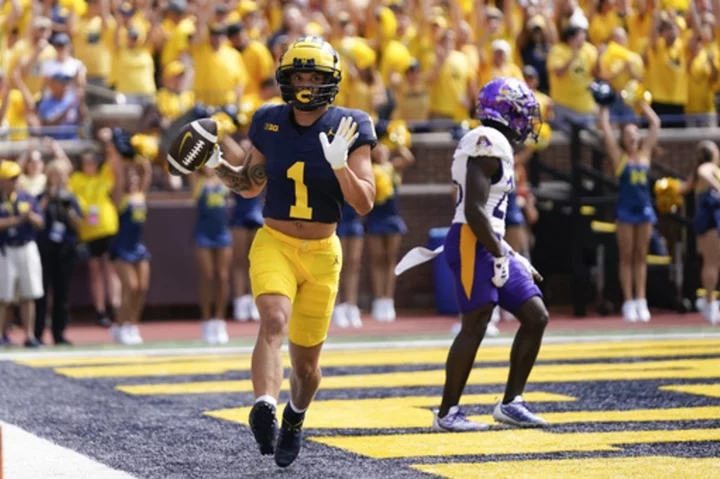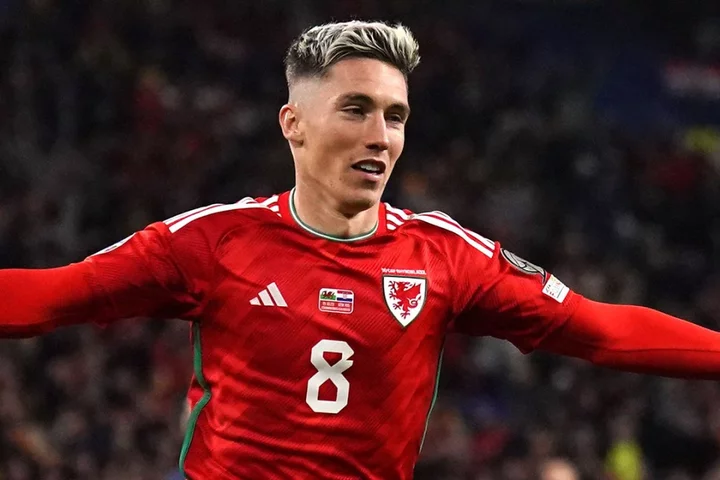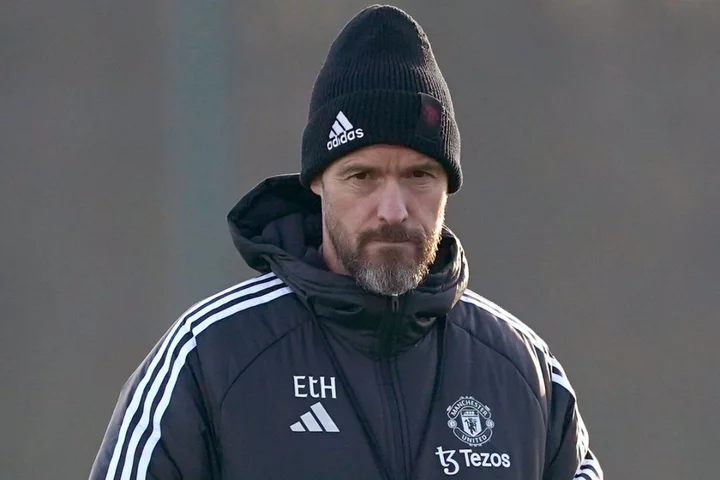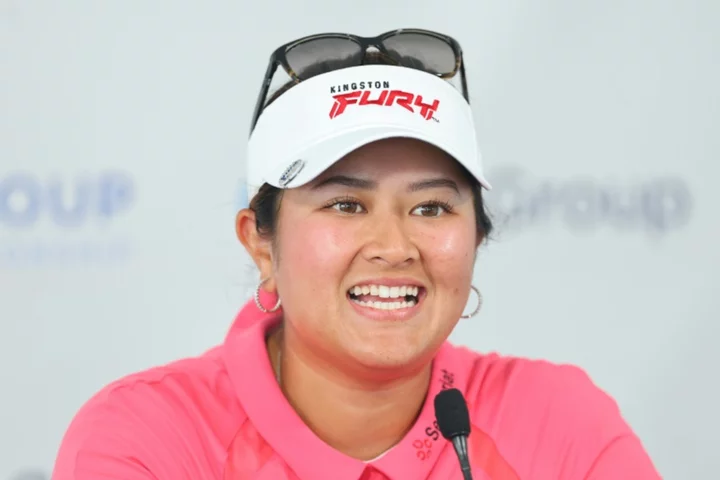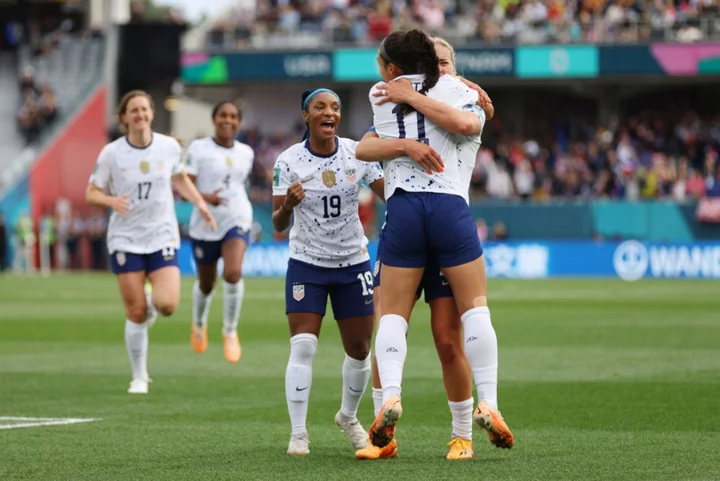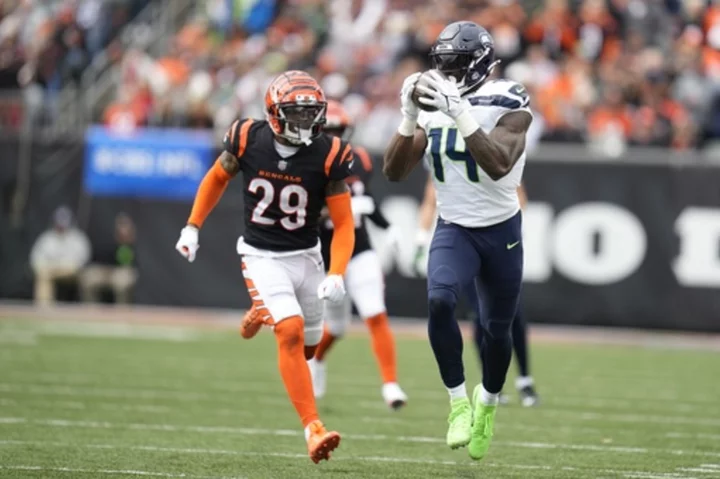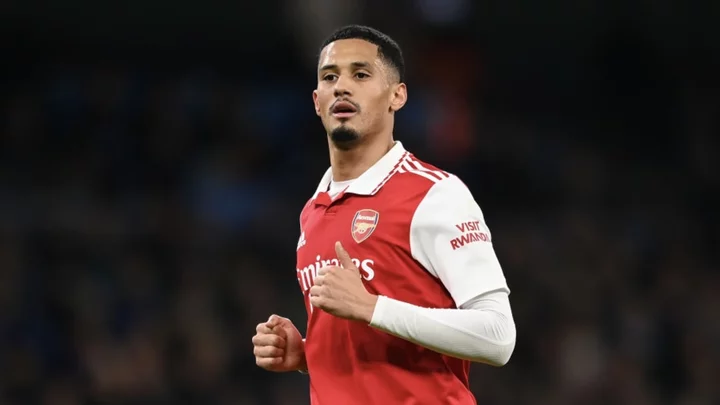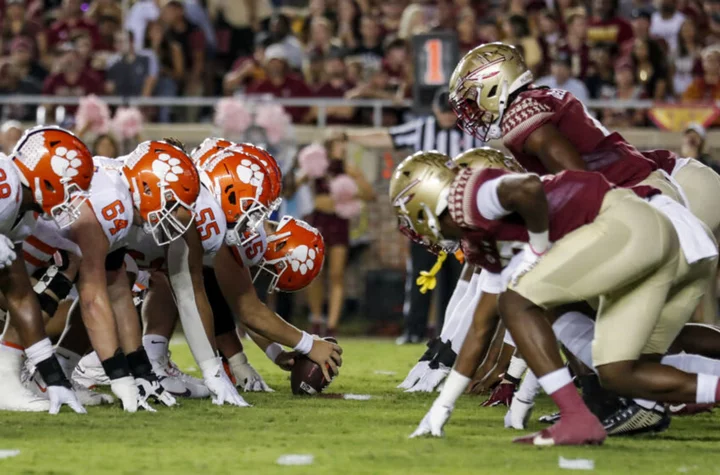You have likely seen the headlines.
"Why the NBA MVP race just got closer than ever." "Fantastic, frantic chase for MVP trophy ends with photo finish." "MVP race too close to call."
Those are three headlines spanning 14 seasons. Innumerable others say the same thing every year. But if history is any indication, you'd need a wide-angle lens for the kind of photo finishes we've seen recently.
Turns out, MVP "races" are more like victory laps.
Before we get into the good stuff, let's establish some context.
Since the 1980-81 season, media members have chosen the recipient of the recently named Michael Jordan Trophy. Broadcasters and writers, it was believed, would be more impartial than players and their innumerable grudges and friendships (the players' desultory votes for All-Stars in recent years bear this out).
Over time, voter eligibility changes, the internet, and policy evolutions have contributed to a constantly shifting landscape. Your favorite team's local broadcaster may have been eligible to cast a secret ballot in 1993 despite only being able to view the hometown squad and a small handful of nationally televised games. No part of that sentence remains true today.
In a vacuum, all of the changes make sense. But a look at the historical data suggests that margins of victory are increasing and first-place votes are consolidating over time. Why is groupthink on the rise?
Below is the winner's share of votes (the winner's total voting points divided by the number of first-place points available) by year since 1981:
There's been a jumpy but undeniable increase in the winner's share of the MVP voting over time, meaning that the eventual winner has increasingly siphoned up the top votes. There hasn't been a share below 0.85 since 2006 (remember this year a few paragraphs from now).
I've added in dotted lines where external changes occurred that are worth mentioning.
The first was the launch of NBA League Pass in 1995. League Pass granted diehard fans -- and media members -- access to the whole league on any given night. Sick of the Chicago Bulls being on every national TV game for nearly a decade straight? Flip on over to the Jazz. It granted new visibility to the league's non-glamour teams and players.
In later years, the NBA instituted open ballots to ensure accountability and removed local broadcasters from the voting pool.
But the biggest milestone was the invention of Twitter in 2006. The NBA milieu has an outsized presence on Instagram, Reddit, and most other networks, but Twitter (now X) remains the league's preeminent "town square." Voters interact with fans, other media members, trolls -- anyone at all! -- while giving their own informed opinions and encountering a constant, babbling stream of feedback.
Twitter quickly became a double-edged sword. On the one hand, it allowed for a free exchange of data, viewpoints, statistics, film, and ideas. Used properly, it can be the best and easiest way to see compelling cases laid out for and against all the candidates.
I spoke with NBA TV host and TNT reporter Jared Greenberg, an MVP voter for nearly a decade. He believes the social media discourse to be an overall positive. "It gives you more to chew on... for me, it allows me to put more ideas on the plate and digest all this information. In every aspect of life, more information, more data is better."
On the other hand, voters have to brave a swarm of angry bees to ingest any honey. The Twitterverse, a changing, malevolent entity, forms its own expectations. A vote against its favorite player can bring down an unending stream of hellfire.
Writer Andy Larsen found that out the hard way when he dared to be one of the two voters not to pick Paolo Banchero as the 2023 Rookie of the Year. Larsen knew it was a losing vote; the consensus around Banchero's season had formed months before the voting occurred. But by daring to cast a vote that wasn't the "right" vote, according to the masses (and nearly all of his peers), Larsen opened himself up to a biblical deluge of criticism.
As Larsen wrote in an article for his employer, the Salt Lake Tribune: "Interestingly, many commenters weren't happy to leave feedback on Twitter. Instead, they looked up my personal Instagram and Facebook pages, posting comments on my old photos. I received emails and phone calls, had strange and critical voicemails." Larsen faced slurs, virulent outrage, and messages suggesting he should kill himself.
And that was in a blowout race for a much lesser award than MVP. Why would a voter want to vote against the consensus and invite an even messier blowback? If a voter truly believed two or three candidates were equally worthy, the allure of choosing the "safer" pick would be strong.
Remember the last time the winner's share was below .85? 2006, the last vote before Twitter became publicly available.
That consolidating impact is even more apparent when we examine the gap in the percentage of first-place votes the top two candidates receive (we look at percentages instead of raw vote totals to account for a changing number of voters each year):
Look at the shape change starting almost exactly with Twitter's birth! The troughs, which would showcase a tight two-man race, disappear entirely.
You'll notice that the last major "close" race, at least by first-place voting tallies, was Steve Nash (65 first-place votes out of 127) vs. Shaq (58) in 2005. (That weird sub-zero dip in 1990 is due to Magic Johnson beating Charles Barkley for MVP despite garnering fewer first-place votes.) Since then, it's been an unbroken stream of massive blowouts. In the last 15 years, the closest margin of first-place votes was when Jokic received "just" 65 out of 100 first-place votes compared to Joel Embiid's 26 in 2022.
Fear of direct backlash isn't the only reason for the increasing concentration of votes. The popularization of data and analytics has made it harder to justify fringe selections (possibly for the better). Here is a chart showing the declining numbers of players receiving first-place votes in a given season:
If you adjust 2021 down from six to five (the NBA allowed a fan vote that decided bench player Derrick Rose ought to be MVP that year; more on that later), we haven't had more first-place MVP candidates than Captain Hook has fingers since … 2006, the last year before Twitter was established. What a coincidence.
Statistics and individual talent are, of course, tightly correlated. But the false precision of decimal points overwhelms context and gives box-score-watchers seemingly unassailable ammo in online conversations. Embiid's recent MVP was the first time in the last seven seasons that the league's leader in the popular but simplistic advanced stat (is that an oxymoron?) Player Efficiency Rating didn't win the award (h/t Ben Rohrbach at Yahoo! Sports), and his victory may have been more about denying Jokic a third straight trophy than about Embiid himself.
Discussions about voters' reluctance to give a third-straight MVP have risen to prominence in recent years. Both Giannis Antetokounmpo and Nikola Jokic won consecutive MVPs before failing to secure a third. Both players had third seasons comparable to the eventual winners, but neither had won a championship or even experienced the Finals before that third season.
Only three players in league history have won back-to-back-to-back MVPs: Wilt Chamberlain, Bill Russell, and Larry Bird. Here's a fun fact: Since Bird ripped off three straight, eight players have combined for nine runs of two-straight MVPs (LeBron James won four in five years). None have pulled off the hat trick.
The glass ceiling on a third MVP has developed a name: voter fatigue.
When asked, voters themselves will say different things. Greenberg told me bluntly, "Voter fatigue is bullsh*t." He further explained that his vote was "not about putting it in the context of the 76-year history of the league; it's about that player in that season compared to the other players in that season."
Many, perhaps most, voters profess similar sentiments. And many act on it. But not all.
Sam Amick told The Athletic, "When a certain player has won the award in back-to-back seasons, especially, you take the historical factor into play." William Guillory further piled on: "I can't justify voting a guy to win three years in a row if I think he's basically having the same season he had in previous years. The historical context matters."
Here is the winner's share graph from above with names attached:
It's somewhat surprising how many double-winners we've had since the 2000s, but it's an easy narrative to understand. If someone were an MVP once and performed even better the next year, another player would have to make a Carl Lewis leap to take the throne, right?
Of the nine runs of double-winners since Bird, the second win had a higher share than the first win on six occasions, signifying stronger voter support the second time around. Despite that, none of those players could carry over their momentum into a third term in office.
If winning two MVPs invalidates an MVP-worthy candidate the following year, the next-strongest contender will get a huge leg up thanks to competing against a lame-duck incumbent. This further concentrates votes.
One other factor that must be mentioned: it appears that wildly divergent voters are punished. Since open ballots were instituted, Owen Phillips, formerly of FiveThirtyEight and currently a Knicks employee, counted a handful of "contrarian" voters who had unusual cards and were then seemingly stripped of their vote the following season. The NBA removed the official fan vote after the fans decided Rose should be MVP in 2021 when he started just three games. Several of these removals may have been justified (like the fan vote; come on, people!), but it's another reason voters may feel pressured to stay within appropriate boundaries.
Groupthink and its incestuous cousins, echo chambers, fear of backlash, and confirmation bias, have almost certainly winnowed voting diversity, like my toddler discarding the shirts he doesn't want to wear before finally, mercifully, settling upon the one he does.
A more charitable reading exists, however. In the digital age, it's easier than ever to find relevant information about candidates, encounter informed opinions, and have thoughtful conversations with peers in the media, fans, and even league and team personnel to form grounded opinions. A few clicks of a button pull up any statistics you might want, and a few more will get you an unending stream of film clips -- not just highlights, but the dull, every-game actions that separate great players from astonishing ones.
Perhaps all this information merging is creating a consensus because voters are better able to actually identify who the most valuable players are. Maybe there really is one clear-cut deserving winner every year. It's impossible to say for sure.
So where does that leave us?
All factors, both benign and nefarious, seem to be influencing voting in the same direction: toward a consensus candidate. The data backs this up, as we've seen.
Some of this is undeniably positive. Do we really want "protest votes" for guys like Carmelo Anthony (2013) or Peja Stojaković (2004)? Should fans be allowed to create online voting bots to give the league's most prestigious award to bench players?
But at the same time, creative friction is a positive. We should be examining something as important as MVP from all angles, even if a certain player's candidacy seems ridiculous. Interesting conversations can arise. The opacity of the word "valuable" can jumpstart fascinating conversations on its own. Should voters value winning at all costs? Being the best player in the world? Doing the most with the least? Breaking through barriers? Creating monetary value? How does history play into things?
In Japan, there's an old saying: "The nail that sticks out gets hammered down." In today's world, a voter must be a particularly brave nail to risk an increasingly eager hammer. As Amick put it to HoopsHype back in 2019, "Fear of social-media reprisal, if you will, is real. It's hard to not see that as a factor. I can't specifically think of any situations where I was unsure of who to vote for and leaned a certain way because of that factor… But there are definitely some people who feel that a few years ago, had votes not been publicized, Stephen Curry wouldn't have won unanimously."
Publicly available and increasingly complex data, worries about public backlash, and the ability to persuade and be persuaded by other reasonable people have all contributed to a greater concentration of MVP votes. Is that a bad thing? I'm not sure; these same voters comprise some of the most influential basketball thinkers on the planet. Their collective output goes a long way toward swaying fans and other media alike. I'm hard-pressed to point to a specific year that showed a woeful result, even if the process seems iffy; but then again, when the tastemakers are also the cooks, how can I be sure?

